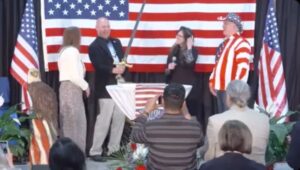Doug Mastriano, the GOP nominee for Pennsylvania governor, is the tip of the theocratic movement’s political spear for now.
He’ll probably be soundly beaten in Tuesday’s election, if polls are believed, and if that happens his future status in the movement is unclear. Americans love winners, and losing takes the shine off a person. (Which goes a long way to explain Trump’s insistence he didn’t lose.)
Common sense argues against a Mastriano victory; he shuns the media, editorials are against him, and his rallies are closed to outsiders. He’s also an extremist who promotes vaccine, election, and QAnon conspiracy theories. That’s not how you assemble a winning voter base.
Mastriano is an avowed Christian nationalist whose ideas of governance are at odds with our constitutional framework of secular government. Huffington Post says he’s part of “a sect that sees its victory as inevitable and predestined from above, and which paints its opponents as the literal incarnations of the Devil in need of vanquishing. In this view, democracy is merely a roadblock in a divine quest for domination.” (See story here.)
Needless to say, there’s no place in that worldview for democracy, or toleration of other religions or viewpoints. “This theocratic philosophy makes no room for equal governance in a pluralistic society like that of the United States,” the Huffington Post article says. Nor are these people who are going to offer any accommodation to others unlike themselves.
At a typical Christian nationalist meeting, speakers tell attendees “they — the true, real Americans — are under attack on all fronts, and their salvation lies in seizing political and cultural institutions to pave the way for the Second Coming of Christ,” a reporter following the tour has observed.
The religious movement behind these meetings is best viewed as existing alongside the Republican Party, but not of it. It’s unclear how influential the movement will become in the GOP, especially if candidates like Mastriano go down to electoral defeat.
He isn’t its leader; it’s sprinkled with self-appointed prophets, who assume that role. He taps into it for political support and votes.
What about the Constitution? Mastriano doesn’t respect separation of church and state, and if elected likely would violate it; then lawsuits would be brought. What if he didn’t respect court orders, either? Theocrats usually believe “God’s higher law” supersedes worldly laws. Would — could — court rulings be enforced against a governor who has extensive control over the state’s enforcement apparatus?
This is a crucial question, because the law is what protects us from mayhem, and Mastriano also hobnobs with QAnon, which is even more dangerous than his ties to a theocratic movement, once you understand what QAnon is really about. A history professor who studies apocalyptic religion and political violence describes QAnon as a “mass murder fantasy” that believes in a “coming storm when all of the MAGA movement’s enemies will be arrested and lynched.”
He says their ideology that its opponents are “monsters” and “something needs to be done about them” is something that “should worry us … QAnon’s actual core is that you need mass murder to save America.” That’s obviously even more dangerous than theocratic government.
But what if a theocratic government embraced the QAnon movement, and the two went hand in hand? You’d be living in the Middle Ages in 21st century America.
Photo below: GOP gubernatorial candidate wielding a sword symbolic of “striking down enemies” at a religious gathering
